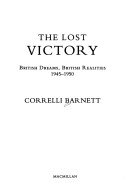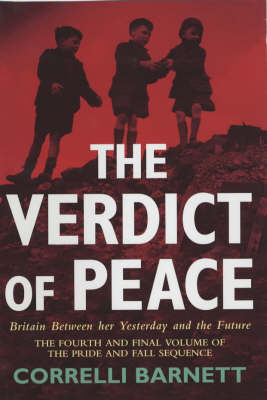Pride and Fall sequence
4 total works
Correlli Barnett described his Audit or War as an 'operational study' to 'uncover the causes of Britain's protracted decline as an industrial country since the Second World War.' First published in 1986, the book swiftly became one of the most controversial and influential historical works of its time.
'[The Audit of War] argued that British industry during the Second World War was scandalously inefficient, a situation Barnett blamed on an establishment more concerned with welfare than with industry, technology or the capacity of the nation to fight a war... Alan Clark records approvingly that Mrs Thatcher herself read it...' David Edgerton, London Review of Books
'A stimulating polemic.' Times Literary Supplement
'A formidable book, essential reading.' Asa Briggs, Financial Times
'[The Audit of War] argued that British industry during the Second World War was scandalously inefficient, a situation Barnett blamed on an establishment more concerned with welfare than with industry, technology or the capacity of the nation to fight a war... Alan Clark records approvingly that Mrs Thatcher herself read it...' David Edgerton, London Review of Books
'A stimulating polemic.' Times Literary Supplement
'A formidable book, essential reading.' Asa Briggs, Financial Times
In this volume, Correlli Barnett explains the decay of British power between 1918 and 1940 and its final collapse between 1940 and 1945. Some have sought to expalin this ineptitude, particularly between the two world wars, by citing the tremendous costs of the First World War in both treasure and manpower. Not so, says Corelli Barnett, who ruthlessly identifies the root causes which reduced Britain eventually to a satellite of the USA. Ranging over 100 years, drawing together arguments from many spheres - education and industry, diplomatic and imperial history, Cabinet papers and the Press - it is as fascinating to read as it is significant.
In 1945 Britain emerged triumphant and victorious from the Second World War. On 26 July, after a landslide Labour victory, Clement Attlee became Prime Minister and the nation looked forward to a 'New Jerusalem', a land in which poverty, ill health, slum housing and unemployment would be banished by lavish state expenditure. In this brilliant, savage and original book based on fascinating new material from Cabinet and other Whitehall records, Correlli Barnett shows how the enormous double cost of these policies fell on a bankrupt and technologically backward economy. He demonstrates how the Labour government chose to squander a huge American loan and then Marshall Aid in pursuit of these twin dreams, instead of investing substantially in modernising Britain. He argues that, as a result, by the start of the Korean War in 1950, Britain, unlike Germany and Japan, had failed to lay the foundations for an 'economic miracle'. An outstandingly important book which casts new light not only on Britain's recent past but also on her present and future.
The Verdict of Peace grippingly evokes the dying embers of Britain's twentieth-century influence. Controversial and original, this is the definitive study of Britain's decline as a great industrial nation.Between the outbreak of the Korean War in 1950 and the Suez debacle of 1956, Great Britain squandered every opportunity to re-invent herself as industrial nation. While Japan and Germany progressed and evolved, Britain stagnated. The new technologies passed her by, leaving other countries to dominate market share. All this while industry stalled under prolonged industrial action and a chronic shortage of skilled workers. Correlli Barnett examines how British leaders and public opinion became beguiled by Britain's immediate past; as a victor in The Second World War, as an imperial power and by the ideals passed down from the Victorian age.This is a fitting conclusion to the remarkable The Pride and the Fall sequence.



